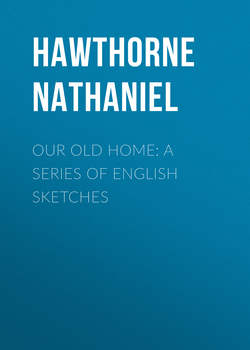Читать книгу Our Old Home: A Series of English Sketches - Hawthorne Nathaniel - Страница 1
ОглавлениеTo Franklin Pierce,
As a Slight Memorial of a College Friendship, prolonged through Manhood, and retaining all its Vitality in our Autumnal Years,
This Volume is inscribed by NATHANIEL HAWTHORNE.
TO A FRIEND
I have not asked your consent, my dear General, to the foregoing inscription, because it would have been no inconsiderable disappointment to me had you withheld it; for I have long desired to connect your name with some book of mine, in commemoration of an early friendship that has grown old between two individuals of widely dissimilar pursuits and fortunes. I only wish that the offering were a worthier one than this volume of sketches, which certainly are not of a kind likely to prove interesting to a statesman in retirement, inasmuch as they meddle with no matters of policy or government, and have very little to say about the deeper traits of national character. In their humble way, they belong entirely to aesthetic literature, and can achieve no higher success than to represent to the American reader a few of the external aspects of English scenery and life, especially those that are touched with the antique charm to which our countrymen are more susceptible than are the people among whom it is of native growth.
I once hoped, indeed, that so slight a volume would not be all that I might write. These and other sketches, with which, in a somewhat rougher form than I have given them here, my journal was copiously filled, were intended for the side-scenes and backgrounds and exterior adornment of a work of fiction of which the plan had imperfectly developed itself in my mind, and into which I ambitiously proposed to convey more of various modes of truth than I could have grasped by a direct effort. Of course, I should not mention this abortive project, only that it has been utterly thrown aside and will never now be accomplished. The Present, the Immediate, the Actual, has proved too potent for me. It takes away not only my scanty faculty, but even my desire for imaginative composition, and leaves me sadly content to scatter a thousand peaceful fantasies upon the hurricane that is sweeping us all along with it, possibly, into a Limbo where our nation and its polity may be as literally the fragments of a shattered dream as my unwritten Romance. But I have far better hopes for our dear country; and for my individual share of the catastrophe, I afflict myself little, or not at all, and shall easily find room for the abortive work on a certain ideal shelf, where are reposited many other shadowy volumes of mine, more in number, and very much superior in quality, to those which I have succeeded in rendering actual.
To return to these poor Sketches; some of my friends have told me that they evince an asperity of sentiment towards the English people which I ought not to feel, and which it is highly inexpedient to express. The charge surprises me, because, if it be true, I have written from a shallower mood than I supposed. I seldom came into personal relations with an Englishman without beginning to like him, and feeling my favorable impression wax stronger with the progress of the acquaintance. I never stood in an English crowd without being conscious of hereditary sympathies. Nevertheless, it is undeniable that an American is continually thrown upon his national antagonism by some acrid quality in the moral atmosphere of England. These people think so loftily of themselves, and so contemptuously of everybody else, that it requires more generosity than I possess to keep always in perfectly good-humor with them. Jotting down the little acrimonies of the moment in my journal, and transferring them thence (when they happened to be tolerably well expressed) to these pages, it is very possible that I may have said things which a profound observer of national character would hesitate to sanction, though never any, I verily believe, that had not more or less of truth. If they be true, there is no reason in the world why they should not be said. Not an Englishman of them all ever spared America for courtesy's sake or kindness; nor, in my opinion, would it contribute in the least to our mutual advantage and comfort if we were to besmear one another all over with butter and honey. At any rate, we must not judge of an Englishman's susceptibilities by our own, which, likewise, I trust, are of a far less sensitive texture than formerly.
And now farewell, my dear friend; and excuse (if you think it needs any excuse) the freedom with which I thus publicly assert a personal friendship between a private individual and a statesman who has filled what was then the most august position in the world. But I dedicate my book to the Friend, and shall defer a colloquy with the Statesman till some calmer and sunnier hour. Only this let me say, that, with the record of your life in my memory, and with a sense of your character in my deeper consciousness as among the few things that time has left as it found them, I need no assurance that you continue faithful forever to that grand idea of an irrevocable Union, which, as you once told me, was the earliest that your brave father taught you. For other men there may be a choice of paths, – for you, but one; and it rests among my certainties that no man's loyalty is more steadfast, no man's hopes or apprehensions on behalf of our national existence more deeply heartfelt, or more closely intertwined with his possibilities of personal happiness, than those of FRANKLIN PIERCE.
THE WAYSIDE, July 2, 1863.
